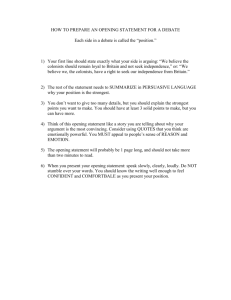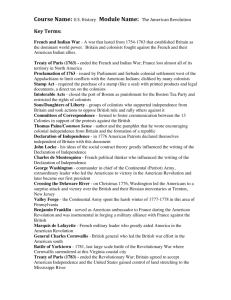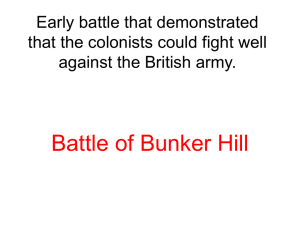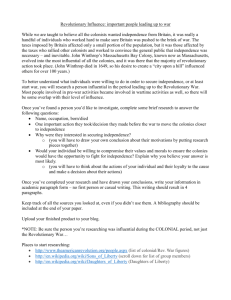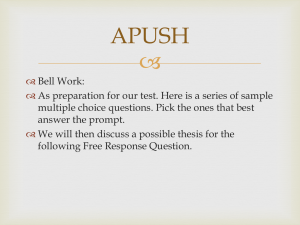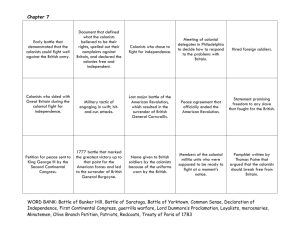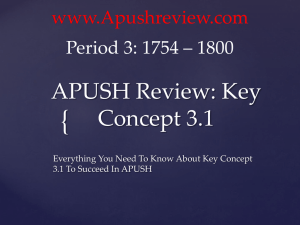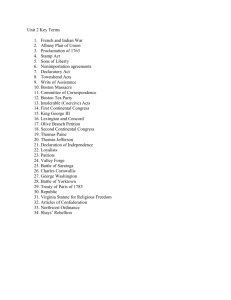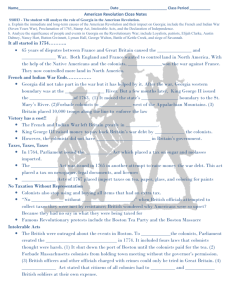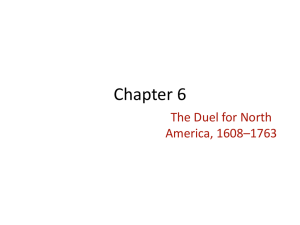American History I: Unit 2 SG Key Mercantilism is when a country
advertisement
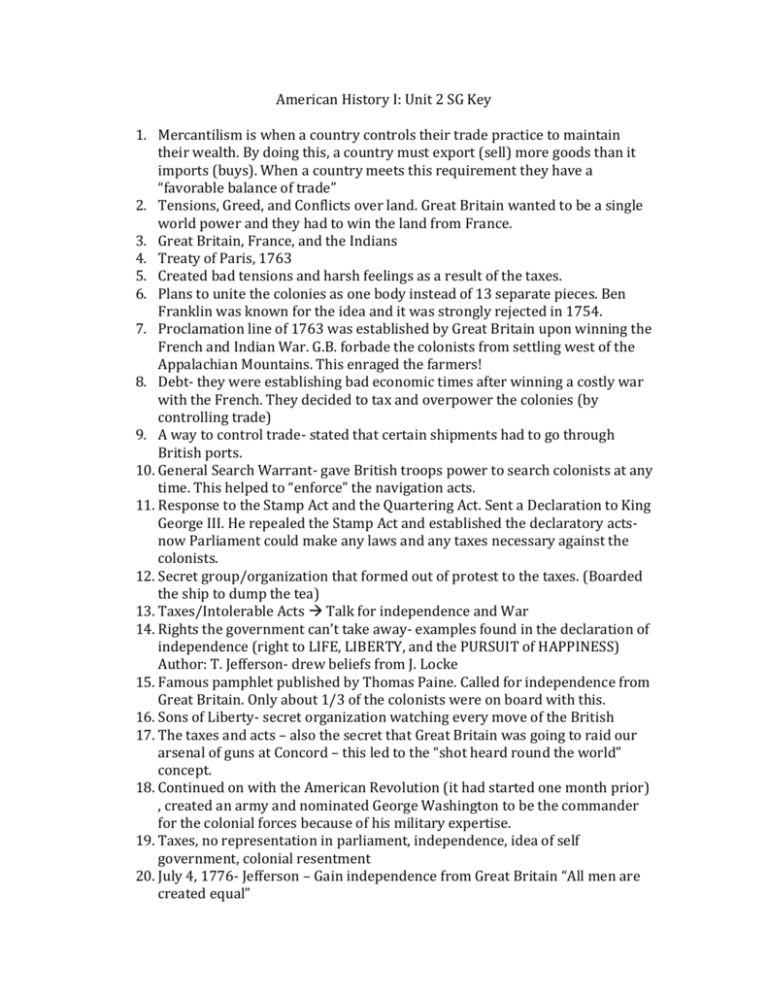
American History I: Unit 2 SG Key 1. Mercantilism is when a country controls their trade practice to maintain their wealth. By doing this, a country must export (sell) more goods than it imports (buys). When a country meets this requirement they have a “favorable balance of trade” 2. Tensions, Greed, and Conflicts over land. Great Britain wanted to be a single world power and they had to win the land from France. 3. Great Britain, France, and the Indians 4. Treaty of Paris, 1763 5. Created bad tensions and harsh feelings as a result of the taxes. 6. Plans to unite the colonies as one body instead of 13 separate pieces. Ben Franklin was known for the idea and it was strongly rejected in 1754. 7. Proclamation line of 1763 was established by Great Britain upon winning the French and Indian War. G.B. forbade the colonists from settling west of the Appalachian Mountains. This enraged the farmers! 8. Debt- they were establishing bad economic times after winning a costly war with the French. They decided to tax and overpower the colonies (by controlling trade) 9. A way to control trade- stated that certain shipments had to go through British ports. 10. General Search Warrant- gave British troops power to search colonists at any time. This helped to “enforce” the navigation acts. 11. Response to the Stamp Act and the Quartering Act. Sent a Declaration to King George III. He repealed the Stamp Act and established the declaratory actsnow Parliament could make any laws and any taxes necessary against the colonists. 12. Secret group/organization that formed out of protest to the taxes. (Boarded the ship to dump the tea) 13. Taxes/Intolerable Acts Talk for independence and War 14. Rights the government can’t take away- examples found in the declaration of independence (right to LIFE, LIBERTY, and the PURSUIT of HAPPINESS) Author: T. Jefferson- drew beliefs from J. Locke 15. Famous pamphlet published by Thomas Paine. Called for independence from Great Britain. Only about 1/3 of the colonists were on board with this. 16. Sons of Liberty- secret organization watching every move of the British 17. The taxes and acts – also the secret that Great Britain was going to raid our arsenal of guns at Concord – this led to the “shot heard round the world” concept. 18. Continued on with the American Revolution (it had started one month prior) , created an army and nominated George Washington to be the commander for the colonial forces because of his military expertise. 19. Taxes, no representation in parliament, independence, idea of self government, colonial resentment 20. July 4, 1776- Jefferson – Gain independence from Great Britain “All men are created equal” 21. Both are dealing with the relationship between the government and the people. Power derives from the people. 22. Rule of law states that the law applies to everyone. No one is above the law. 23. Married to John Adams (President of US, First Lady) She advocated for girls/women to have a equal educational opportunity of a male. 24. Helped them fight for their equal rights 25. Patriots- colonial army “supporters of independence” /Loyalists- remained loyal to Great Britain. Didn't fight for independence 26. Debt- this is evident looking at any of the acts that were passed to tax the colonists. Also, debt from the American Revolution is evident because of the issue over Shay’s Rebellion and taxes/farmers in jeopardy of losing land. 27. France- helped with supplies, aid, money, military backing. Without France we couldn’t have surrounded GB and forced their surrender 28. General Cornwallis 29. French man who came to the aid of the colonies (helped with aid, supplies, and fighting for independence) 30. Famous poet- “Midnight ride of Paul Revere” –-“The British are coming, the British are coming” on set of American Revolution 31. Treaty of Paris 1783 32. Independence from Great Britain 33. Independence, Self-Government, and Republicanism 34. Very little cook, clean, and child rear. During the war, some women took on the role of the men however while they were fighting 35. “Give me liberty or give me death”- Patrick Henry / “NO taxation without equal representation” – James Otis 36. Unalienable rights- rights you were born with. Right to life, right to liberty, and right to pursuit of happiness. 37. Greed, power, and corruption. They pass new acts that were worst than the first and they do things like close the Boston harbor to stop/restrict trading until the debt from the Boston tea party is paid 38. Battle of Bunker Hill- colonists ran out of ammunition (early battle) 39. Valley Forge (lack of supplies and clothing) 40. Lack of money (no way to tax), lack of support for fighting, lack of military, etc 41. T chart in notes (Advantages/Disadvantages) 42. Battle of Saratoga- first change in the war. France joined the US 43. Showed the American Revolution had started. Colonists were forming to put an end to Britain’s cruel ways. Raiding the arsenal at Concord. But we had already moved all guns and supplies out 44. Battle of Trenton 45. Helped the US defeat Britain. Very trained and highly educated military leader. Trained our guys.

